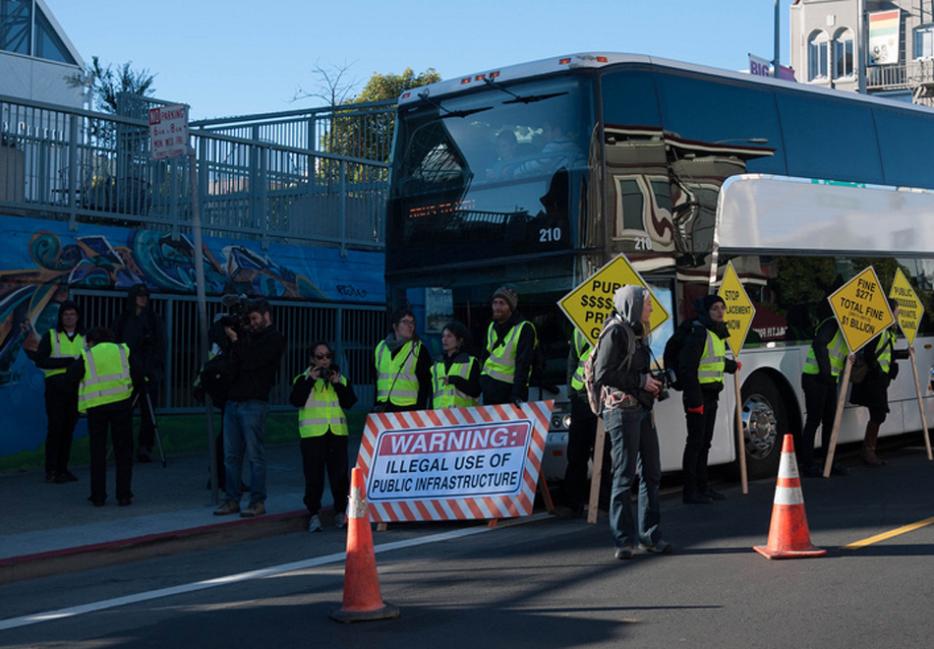After months of outrage bordering on the histrionic, the city of San Francisco announced a deal earlier this month with some of the region’s tech giants, who have been attracting workers in part by offering them the best of both worlds: the opportunity to work in Silicon Valley while living in San Francisco, courtesy of private bus services. The deal will let the tech buses (generically known as “Google buses”) continue to use the city’s bus stops and imposes some mild route restrictions in exchange for about $1.5 million over 18 months.
It is, in all, an episode designed to prove the old axiom about the most intense battles being the ones with the least consequence. $1.5 million is a trivial sum for any one tech company, and is less than a rounding error for the industry as a whole. It’s also a trivial sum for any substantial municipal budget: Toronto regularly ends up with tens of millions of dollars more at the end of its fiscal year than it budgeted for.
The Google bus episode raises plenty of questions about the class dynamics of growing 21st century cities that have been dealt with endlessly elsewhere. The main question that its resolution raises for me, however, is simply, was that so fucking hard? And further, why was that so fucking hard?
It is, on its face, a municipal issue identical in kind to those a hundred different cities face daily: private operators wanting to use public facilities. The answer turns out to be pretty neatly described by the following two-step process: 1) figure out what this costs the city, and 2) charge them for it. If you’re the government, you don’t even have to ask nicely.
It needn’t be much more complicated than that. (You can, if you want, take the advanced course and try to figure out externalities borne by neither the Google buses nor the city—but baby steps, people.) If you’d listened to the rhetoric coming from the activists in San Francisco over the last six months, though, you’d think the global class war was going to be won by a local zoning ordinance. It isn’t, but that doesn’t stop some people from trying.
(And surely, if Google buses have to pay for the use of publicly owned bus shelters, individual drivers should have to pay to use publicly owned roads at much greater per-person expense?)
The Google buses are, of course, just the most visible tip of a deeply stupid iceberg. In Toronto, seven years after the province changed the laws to allow for a greater variety of food served from carts, the city is still consulting on what it should do. The sad thing is, in this instance, consulting may actually be better than the city taking any particular action, considering what happened last time.
The fundamental problem in each of these cases is not that the issues are all that complicated. (Nobody denies the need for some regulation for public health protection.) They can be made complicated by people with axes to grind, or by those who sell axes, but the solutions are often pretty straightforward. The issue is that we don’t want easy solutions, because municipal governance is the last area of politics where our aesthetic preferences are treated seriously in policy discussions.
Don’t like tall buildings? We’ll force the developer to knock off five storeys, even if that drives up the rent. Don’t like food trucks? We’ll only let them operate during daylight hours on alternating Saturdays, and not within 250 metres of an existing restaurant. Don’t like cheap ice cream? We’ll study this problem and get back to you.
There was a time when deregulation was a left-wing political goal, because people like Ted Kennedy (that capitalist running-dog lackey) recognized that the tangle of federal regulations in, say, the airline industry served only two purposes: making the whole sector into a cozy incestuous cartel, and keeping the benefits of air travel out of the hands of the poor and working class.
Talk about easing the rules on zoning, food trucks, or public transportation in today’s cities, though, and you’re assumed to be a member of Ford Nation, or worse—never mind that Rob Ford is not, and has never been, a small-government conservative, if those words are supposed to mean anything in English. The simple question—“Does this have to be so fucking hard?”—is always answered “yes.” There is always something that needs to be protected, whether it’s the “character of the neighbourhood,” the interests of incumbent businesses, or the perceived need for everyone to only use one identical type of bus.
There is an argument for urban government that’s both progressive and governs with a light hand. It is, for now, sitting unused.






